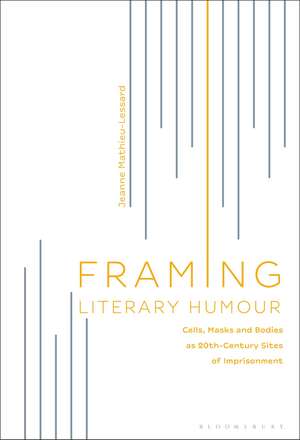Framing Literary Humour: Cells, Masks and Bodies as 20th-Century Sites of Imprisonment
Autor Dr. Jeanne Mathieu-Lessarden Limba Engleză Hardback – 22 ian 2020
| Toate formatele și edițiile | Preț | Express |
|---|---|---|
| Paperback (1) | 216.34 lei 6-8 săpt. | +68.66 lei 4-10 zile |
| Bloomsbury Publishing – 28 iul 2021 | 216.34 lei 6-8 săpt. | +68.66 lei 4-10 zile |
| Hardback (1) | 567.83 lei 6-8 săpt. | |
| Bloomsbury Publishing – 22 ian 2020 | 567.83 lei 6-8 săpt. |
Preț: 567.83 lei
Preț vechi: 815.38 lei
-30% Nou
Puncte Express: 852
Preț estimativ în valută:
108.65€ • 113.45$ • 89.72£
108.65€ • 113.45$ • 89.72£
Carte tipărită la comandă
Livrare economică 15-29 aprilie
Preluare comenzi: 021 569.72.76
Specificații
ISBN-13: 9781501356551
ISBN-10: 1501356550
Pagini: 208
Dimensiuni: 152 x 229 mm
Greutate: 0.45 kg
Editura: Bloomsbury Publishing
Colecția Bloomsbury Academic
Locul publicării:New York, United States
ISBN-10: 1501356550
Pagini: 208
Dimensiuni: 152 x 229 mm
Greutate: 0.45 kg
Editura: Bloomsbury Publishing
Colecția Bloomsbury Academic
Locul publicării:New York, United States
Caracteristici
Challenges existing philosophical and psychoanalytic theories on the nature of humour and its relationship with freedom by framing humour as a product of imprisonment
Notă biografică
Jeanne Mathieu-Lessard teaches French and Francophone literatures at the University of Montréal and the University of Ottawa, Canada.
Cuprins
Preface and AcknowledgmentsIntroduction1. Humour and Imprisonment2. Humour in the Cell: Prison Cells and War Camps3. Social Entrapment: Humoristic Characters vs. the World4. Humour in the Cells: Configurations of the Body as PrisonConclusion: A Geometry of HumourNotesReferencesIndex
Recenzii
Strong on theory, insightful in application, this study illuminates 20th-century literary humour, emphasising the vital duality of concepts of imprisonment and liberation. This is a book that emanates from deep literary understanding of its examples, chosen from several different Western cultures, and which successfully connects the lessons learned to the broader field of humour studies. A book not to be missed by scholars of humour and laughter, regardless of disciplinary background.
At once rigorous and illuminating, Mathieu-Lessard's brilliant book poses major challenges to humor theories that celebrate laughter as pure transgression or liberation. She insightfully reveals the stakes of literary humor in representations of imprisonment, spanning diverse sites of confinement from the Nazi war camp to the social mask to the mortal body. With eloquence and imagination, she grounds the very idea of humor in structures of captivity.
At once rigorous and illuminating, Mathieu-Lessard's brilliant book poses major challenges to humor theories that celebrate laughter as pure transgression or liberation. She insightfully reveals the stakes of literary humor in representations of imprisonment, spanning diverse sites of confinement from the Nazi war camp to the social mask to the mortal body. With eloquence and imagination, she grounds the very idea of humor in structures of captivity.
